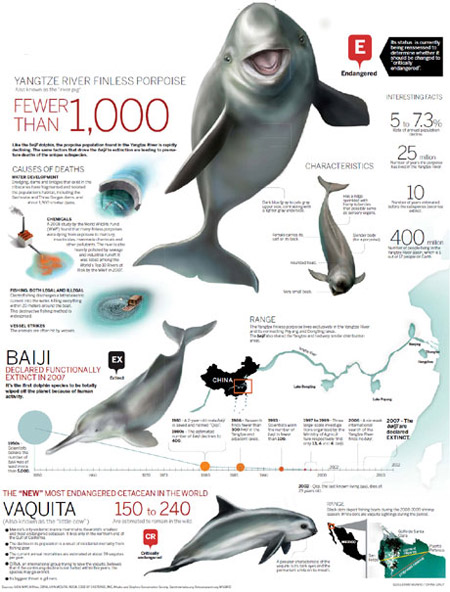Unnatural disaster ahead
Updated: 2012-04-25 11:10
By Wang Ru (China Daily)
|
|||||||||||

'River pigs' face extinction. Their disappearance could cause a massive ecological catastrophe. Wang Ru reports.
Two have been found dead every week on average for the last six weeks in Dongting Lake, Hunan province. Yangtze Daily reports more than 20 other casualties have been found in Poyang Lake, Jiangxi province, since February, including four this month.
These are alarming statistics of the Yangtze finless porpoise, aka the "river pig".
One of six porpoise species, the finless porpoise lives in the coastal waters of Asia, especially around India, China, Indonesia and Japan. A unique freshwater population is found in the Yangtze River.
However, there have been reports of deaths in the Yangtze population's major habitats in the river's lower and middle reaches this year.
At the rate it's going, the unique population faces extinction within a decade.
What's more alarming is the way the animals die - or, rather, are killed - by human activities.
Poyang Lake is estimated to have 300-400 Yangtze finless porpoises, one-third of the subspecies' total population.
There are two natural reserves for finless porpoises. Poyang Lake, China's biggest freshwater lake, is believed to be the rare subspecies' last paradise.
Fishing is banned in Dongting and Poyang lakes from March to July, the river pig's breeding season.
Still, the animal is declining at a rate of 5-7.3 percent annually.
Dong Lijun, a professor from the Chinese Academy of Sciences' Institute of Hydrobiology, says that because porpoises live in groups, one dead member could endanger four others.
Autopsies of dead porpoises from Poyang Lake reveal the animals' stomachs were empty, suggesting they could have starved.
Sand dredging, which is important for economic growth, is also causing premature deaths.
"Sand dredging causes the lake's waters to become muddy and affects visibility," Institute of Hydrobiology professor Wang Kexiong says.
"The porpoises cannot see as far as they could before and must rely on their highly developed sonar systems to avoid obstacles and find food."
Chemical wastes from factories near the lake also harm the ecosystem. They kill not only finless porpoises but also a large number of fish.
Although the Yangtze finless porpoise population is smaller than the giant panda's, it's currently only under second-grade State protection.
The river pig's sister species, the baiji dolphin, was declared extinct in 2006.
"The fate of the finless porpoise is likely to follow that of the baiji dolphin," World Wildlife Fund China program officer Wei Baoyu says.
"What's worrying is that if the porpoise population is gone, it will mean the Yangtze won't be a livable environment for other species, because river pigs are at the top of the river's food chain. If that happens, it could be a massive ecological disaster."
Today's Top News
Rescuers race against time for quake victims
Telecom workers restore links
Coal mine blast kills 18 in Jilin
Intl scholarship puts China on the map
More bird flu patients discharged
Gold loses sheen, but still a safe bet
US 'turns blind eye to human rights'
Telecom workers restore links
Hot Topics
Lunar probe , China growth forecasts, Emission rules get tougher, China seen through 'colored lens', International board,
Editor's Picks

|

|

|

|

|

|





